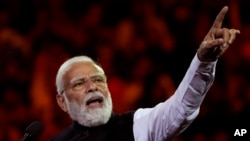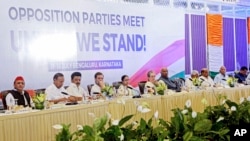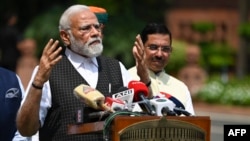Nine years after Indian Prime Minister Narendra Modi led his Hindu nationalist Bharatiya Janata party to a spectacular victory, he continues to be India’s most popular leader and is expected to win a third term in elections due next year.
Now, aiming to mount a collective challenge to the strong, charismatic leader in 2024, 26 opposition parties forged an alliance this week. The disparate group includes the main opposition Congress Party and a raft of regional parties that command significant support in several Indian states.
They have called the alliance INDIA, an acronym for Indian National Developmental Inclusive Alliance. Opposition Congress Party leader, Rahul Gandhi, billed next year’s election as “a fight between Narendra Modi and INDIA.”
“They feel that if they contest alone, they will not be able to put up a credible challenge to the BJP but coming together will help them in putting up a decent fight,” according to Rahul Verma, a fellow at the Center for Policy Research in New Delhi. “A coalition like this will enable them to pool their resources.”
Contests for parliamentary constituencies in India often involve multiple candidates, splitting votes three or even four ways. As a result, parties win elections even if they secure less than 50% of the votes cast.
“The figures of 2019 showed that BJP had about 37% of the total vote and non-BJP parties accounted for 63%. So, if they could consolidate a chunk of this through one-on-one contests, then the opposition vote will not get divided,” pointed out independent political analyst Neerja Chowdhury. “That is the heart of their strategy to take on Modi.”
'Safeguard the idea of India'
The INDIA alliance, whose name has been chosen to strike a chord of nationalism, has said its goal is to protect democracy. Pledging to "safeguard the idea of India as enshrined in the Constitution," it said in a statement that the "character of our republic is being severely assaulted in a systematic manner by the BJP.”
Critics have accused Modi’s government of undermining democracy and press freedom, polarizing the country along communal lines and using federal investigative agencies to target opposition leaders – charges it strongly denies.
"We resolve to fight the systemic conspiracy by BJP to target, persecute and suppress our fellow Indians," the INDIA alliance said.
While the coming together of key regional parties like the Trinamool Congress and the Samajwadi Party with the Congress Party marks a significant political turnaround, the path ahead for the opposition group is formidable. Making room for one another in electoral contests will not be easy for parties who have been fierce rivals for decades. Some have been weakened by defections of their members to the BJP. Questions remain whether the disparate group can remain together in the months ahead.
But several observers say that united by a strong anti-BJP sentiment, opposition parties in the INDIA alliance appear willing to sink their differences.
“What we see this time is a certain determination that they are going to make this work,” said political analyst Arati Jerath. “The last five years have seen such an attack on the opposition by the ruling party in terms of filing corruption cases against several opposition leaders or getting them arrested that the BJP has kind of driven them into each other’s arms. I think their compulsion now to stay united is huge.”
Modi slams INDIA alliance
The disqualification of Rahul Gandhi from parliament in March following his conviction in a criminal defamation case filed by a BJP leader had been slammed by several opposition parties and critics as a politically motivated case and an attempt to silence the opposition.
The BJP denies targeting the opposition and has denounced the INDIA alliance.
On Tuesday, even as opposition members held their meeting, the BJP also celebrated nine years in power at a gathering in New Delhi along with 38 allies, most of them small groups and exuded confidence about clinching a convincing victory next year.
At the meeting, Modi slammed the INDIA alliance calling it a “hardcore corruption convention” and said “people have already decided to bring our government back in 2024.”
But political analysts say there are signs of anxiety in the BJP, which was recently routed in the southern Karnataka state by the Congress Party and has also suffered setbacks in some other states.
“The BJP appears rattled. There is definitely some nervousness in the party,” said Jerath. “The BJP is trying to drive a wedge to stop the opposition unity and we have to see if the INDIA alliance can stay the course.”
Still, political analysts point out that Modi’s approval ratings are high and he remains a charismatic leader. And while Modi, who is the face of the BJP, is seen as a crowd puller, the INDIA alliance lacks a clear leader.
“All polls continue to indicate that Modi remains very popular. Anecdotally you hear people saying that he is losing his charisma but there is no hard evidence to back that. And losses in state elections cannot be a barometer of what happens in national elections,” according to Verma.
While it will be a huge challenge for the INDIA alliance to take on the BJP, analysts say it may be able to make a dent in the huge majority the Hindu nationalists command in parliament — in 2019, the BJP won 303 seats in the 545-member parliament.
“What they could do realistically, is bring down their tally by 70-80 seats and stop them for getting a clear majority, which will create the checks and balances in the system,” said Chowdhury.






